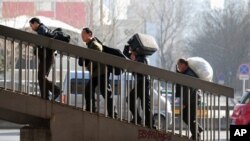Critics are calling on the Chinese government to overhaul the hukou household registration system. They say it deprives millions of rural migrant workers of vital public services in cities, creating what has been described as China's apartheid.
There has been much discussion at the National People's Congress this month about changing China's household registration system, called the hukou.
The hukou registers Chinese in their place of birth. It essentially binds them to their hometown and means millions of rural migrant workers can not access public services in the cities, such as affordable education for their families.
This has created a wealth gap and a two-tier society. It is also the source of rising resentment, which worries the government.
At the opening of the current National People's Congress, Premier Wen Jiabao said the government will reform the system.
Mr. Wen says the government will relax requirements in a step-by-step manner, to gradually ensure that migrant workers receive the same treatment as urban residents.
In Beijing, migrant Xiao Lu is one of the millions listening to the hukou discussion intently.
She and her husband cannot afford schooling and housing for their six-year-old twin boys, who must live with their grandparents in their native, faraway Anhui province.
They, like most of the 150 million migrant workers who have left for the cities in search of a better future, see their family only once a year, during Chinese New Year.
Xiao Lu says she can understand the need for the system but thinks if rural and urban hukous were equal she could think about raising her family in the city she now calls home.
She also thinks the hukou causes the gap between rich and poor and believes this is China's largest issue.
Friction between urban and rural citizens is seen as a threat to social stability.
A growing number of critics have called on the government to reform the system, which has long been viewed as an outdated and economically damaging.
The day before the NPC opened last week, state-controlled newspapers united in an unprecedented editorial calling for reforms to the hukou system, which the Communist government introduced in the 1950s.
Many of the papers have since been punished as hukou reform is a sensitive issue.
Internal critics are not alone, however.
International economists also say the system must be abolished if China's modernization is to continue.
In a recent report, the Organization for Economic Cooperation and Development said that unless far-reaching hukou reform is implemented, China's stability will be threatened and the economy stunted.
The chief author of the OECD report, Richard Herd, said the system should be scrapped entirely as soon as possible - not by piecemeal reform.
"China clearly has to increase the level of urbanization from the current 45 percent of the population to 65 percent over the next 10-15 years to maintain economic growth…. We believe the only way that can be done is for the hukou to be abolished completely. If there is no change to the registration system, a two-tier society will (continue to) be built," he said.
However, some officials and urban residents fear if the system is scrapped, cities like Beijing and Shanghai will be swamped by poor migrants living in shanty towns.
Critics of the system say those fears are overblown.
Geoffery Crothall is with the China Labor Bulletin, an organization in Hong Kong that seeks to defend workers' rights in China. He says rural communities are already like shanty towns, which is why migrants seek out the cities.
The main resistance to reform, he says, comes from the authorities' desire to keep tabs on people.
"What they (the authorities) have to propose is another system of migration management. Other countries can do it without segregating half of the population so China should be able to do it as well," he said.
He says migrant workers will only come into the city if there is work available, not just for free education and other public services.
Significant hukou reforms would represent one of the greatest upheavals in China's modernization drive.
It could also be a boon for international business and trade as tens of millions of workers, like Xiao Lu, prosper and become consumers.
Critics Pressure China to Scrap Divisive Household Registration System




